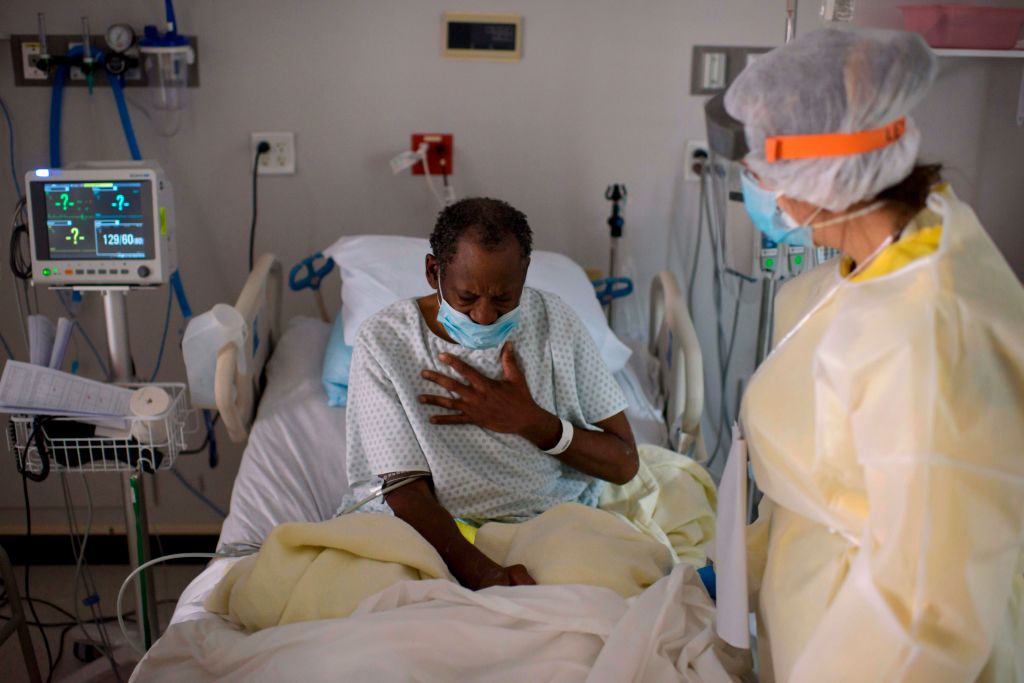More transmissible coronavirus variant may be dominant strain by March — a bad sign for already overwhelmed hospitals


A free daily email with the biggest news stories of the day – and the best features from TheWeek.com
You are now subscribed
Your newsletter sign-up was successful
The fast-spreading COVID-19 variant is set to become the dominant strain circulating in the U.S. as early as March, the Centers for Disease Control and Prevention warned Friday.
While the U.S. currently has fewer than 100 known cases of the fast-spreading coronavirus variant first found in Britain, if actions aren't taken to stop the spread, it'll rapidly take over, the CDC found in a study. The CDC advised the entire health care system to ramp up vaccination efforts and prepare for an influx of hospitalizations — troubling advice given the overwhelmed state of hospitals across the country already.
"We're concerned," Jay Butler, the CDC's deputy director for infectious diseases, told Stat News. "We want to sound the alarm and urge people to continue to do the things that we know work." Modeling by the CDC suggests only rapid vaccinations and strict adherence to social distancing and mask wearing could stop the variant from taking hold. But with vaccine distribution lagging behind expectations, it's hard to imagine they'll do enough in time to prevent the new strain's spread.
The Week
Escape your echo chamber. Get the facts behind the news, plus analysis from multiple perspectives.

Sign up for The Week's Free Newsletters
From our morning news briefing to a weekly Good News Newsletter, get the best of The Week delivered directly to your inbox.
From our morning news briefing to a weekly Good News Newsletter, get the best of The Week delivered directly to your inbox.
So far, 76 infections of the variant, which is seemingly 50 percent more transmissible than the original strain, have been found in people across 12 states. It's very likely there are many more infections across the states. Both COVID-19 vaccines approved in the U.S. have been found to be effective against the new strain.
COVID-19 infections, hospitalizations, and deaths have continually risen to new records over the past few weeks, with the U.S. death count fast approaching 400,000. Hospitals both in rural areas and cities are close to general admittance and ICU capacities, and some have exceeded those limits.
A free daily email with the biggest news stories of the day – and the best features from TheWeek.com
Kathryn is a graduate of Syracuse University, with degrees in magazine journalism and information technology, along with hours to earn another degree after working at SU's independent paper The Daily Orange. She's currently recovering from a horse addiction while living in New York City, and likes to share her extremely dry sense of humor on Twitter.
-
 Nobody seems surprised Wagner's Prigozhin died under suspicious circumstances
Nobody seems surprised Wagner's Prigozhin died under suspicious circumstancesSpeed Read
-
 Western mountain climbers allegedly left Pakistani porter to die on K2
Western mountain climbers allegedly left Pakistani porter to die on K2Speed Read
-
 'Circular saw blades' divide controversial Rio Grande buoys installed by Texas governor
'Circular saw blades' divide controversial Rio Grande buoys installed by Texas governorSpeed Read
-
 Los Angeles city workers stage 1-day walkout over labor conditions
Los Angeles city workers stage 1-day walkout over labor conditionsSpeed Read
-
 Mega Millions jackpot climbs to an estimated $1.55 billion
Mega Millions jackpot climbs to an estimated $1.55 billionSpeed Read
-
 Bangladesh dealing with worst dengue fever outbreak on record
Bangladesh dealing with worst dengue fever outbreak on recordSpeed Read
-
 Glacial outburst flooding in Juneau destroys homes
Glacial outburst flooding in Juneau destroys homesSpeed Read
-
 Scotland seeking 'monster hunters' to search for fabled Loch Ness creature
Scotland seeking 'monster hunters' to search for fabled Loch Ness creatureSpeed Read



